On this page:
- School history
- Curriculum
- The uniqueness of the school
- Graduates
- Language level in three languages
- Students
- Teachers
- Achievements and successes
- Difficulties/challenges

In this interview, Our Kids talks to Anną Maliszewską, founder and director of the International Trilingual School of Warsaw.
School history
Our Kids: How did it happen that you created so many educational facilities which you currently run?
Anna Maliszewska: Because I'm a linguist by education, I wanted to create a truly trilingual nursery, which will enable children to use these three languages in the future. We started in 2009 with three teachers and two children, one of whom was my daughter. And the teachers were a Bolivian, who is working with us today, a Brit, and a Pole. A few months later, we had a waiting list. We didn’t have our own building, so we tried to get one for many years. Now our branches are located in fantastic buildings, but this is the result of long-term efforts.
In the meantime, a preschool was established, and in 2014, we decided to add to new language to our three-language model—Chinese—and create a new three-language model—English-Polish-Chinese model—in our nurseries. Then in Poland, it was an absolute novelty. This was the second very important stage of our development.
The third key moment was in the same year—the acquisition of the traditional French kindergarten and primary school Ecole Antoine de Saint-Exupéry, which was an exact copy of a French kindergarten and school. Preschool groups were half empty at the time of the transfer, and the school was fairly full. When that kindergarten was set up in 2001-2002, there were still many expats in Poland who wanted the French language for their children, but then there were more and more Polish parents who didn’t want to send their children to a 100% French model school, and they sought the Polish curriculum and classes in English.
We decided to approach it differently, because it was clear that someone hadn’t understood the market's needs, and that's why the kindergarten was empty. We decided to create a nursery and a trilingual kindergarten with French, Polish, and English, and that turned out to be a great success. We left French as the only language of instruction, adding subjects/classes taught in Polish and English.
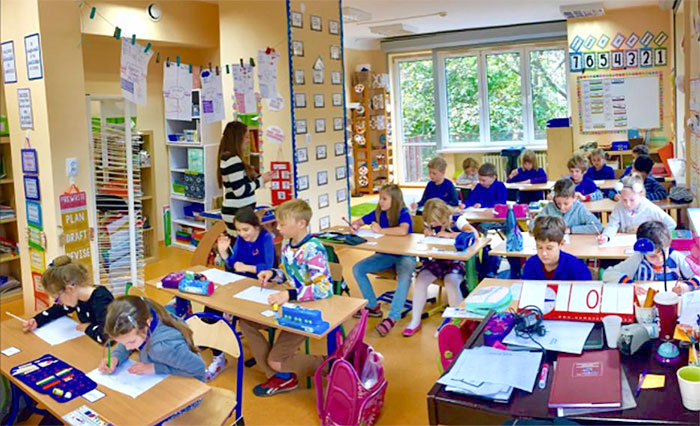
Curriculum
Our Kids: What curriculum did you decide to base this education on?
Anna Maliszewska: Our curriculum is the result of the analysis of five different curricula. The curriculum defines what specifically we want to teach. Therefore, we don’t want to use the IB model, because it doesn’t say what to teach, only what student profile should be shaped, and we wanted to know what to teach.
We have developed a program which is the result of a comparison of curricula from five countries: the US, Britain, Spain, Poland, and France. At the moment, we’re also adding the Chinese-language teaching curriculum taught in Singapore. We compared these programs to see what in each of these countries children in each age group must be able to learn from each field, and later, in elementary school, from each subject.
Our Kids: So your program is like a combination you have drawn from the analysis of these different programs?
Anna Maliszewska: Yes. We say that we teach to the so-called "highest standard." By comparing these five systems, it’s evident that none is better or worse—they’re simply different, because they introduce elements at different stages in the child's life. For example, the British curriculum introduces literacy and numeracy at the age of four, so we’re also introducing these elements this age. This isn’t harmful to Polish children—in fact, going to a Polish school (which introduces writing and reading very late, at the age of seven), they’re simply much better than other children.
We do the same with all languages—we strive for the highest standard. In preschool, we educate children in literacy, numeracy, music, and art, and develop their motor skills, as well as their emotional and social skills. Later, at school, we’re already talking about specific subjects. In Grades 1 to 3, we have language, math, science, and social studies—four subjects are taught in Polish and English according to the same highest standard and in the same time interval.
In the third language (Chinese, French, Spanish, or Japanese), we don’t teach math and science, but only two subjects—language and social studies—the humanistic part, because we assume that if children go to Spain/China someday—given they know math in Polish and English—they’ll catch up in math in Spanish or Chinese in a month. Same with science.
There are of course exceptions because, for example, some children after our primary school will want to go to College Francais, i.e., return to the French system, so we give them less Polish, and more French classes, which means we do science and math in French. In fact, it’s as early as Grade 1 when the parents decide what their kids will do next, after finishing school—whether they’ll go to College Francais, to a Polish high school, or to another school, e.g., British.
This is the case for European children. In the case of, for example, Chinese children, it’s different. For example, we have children whose mother is Polish and father is Chinese. These children do four subjects: science, math, language, and social studies in Polish and English, and two subjects in Chinese—language and social studies. But there are also Chinese children who will return to China someday, and we give them Polish classes and more Chinese classes, because they’ll have to follow a Chinese curriculum in a Chinese school.
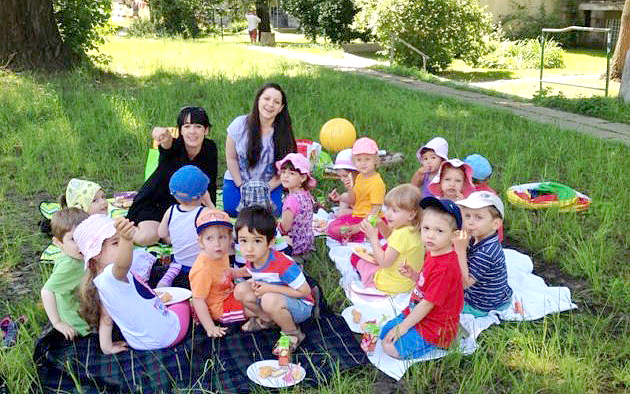
Our Kids: This is probably very complicated logistically. How do you deal with it?
Anna Maliszewska: Our teaching is highly individualized.
Our Kids: Are you obliged to implement the Polish core curriculum?
Anna Maliszewska: Yes, but actually from the nursery to the end of the third grade of elementary school, the Polish core curriculum has much lower expectations and standards than the other ones according to which we work. We can’t do less, but we can certainly do more than it assumes. The Ministry of Education defines the minimum curriculum, as well as how many hours we have to devote to it.
In fact, if we were a typical Polish school, the children would leave at 11am, because the Polish curriculum requires three hours of learning a day, and our children have obligatory lessons until 5 pm, and then they attend workshops. It’s worth emphasizing, however, that children don’t have to do homework at home—they do their homework at school.
Our Kids: How do you implement your curriculum in several languages?
Anna Maliszewska: Let me give you an example: let's assume that children are studying fractions. A Polish teacher, teaching in accordance with the Polish core curriculum, will write the fractions, explain them, and the children will have to solve the problem. An American or British teacher does the same thing differently—he or she brings a pizza, divides it into parts, and explains to children what fractions are used for.
Our Kids: Did you notice any drastic differences in the five curricula you analyzed that couldn’t be reconciled in any way?
Anna Maliszewska: No, there are no such differences. It isn’t a matter of what we teach, but when and in what way. This is the case with math, for example. In the Polish curriculum, Grade 2 is quite slow, in Grade 3, it accelerates slightly, and from Grade 4, it can be said that math is at the university level.
It’s similar with other subjects in the Polish curriculum. The Polish curriculum can be called almost a university system from the fourth grade to the end of high school, which many teachers, pupils, and parents complain about. However, in the French or British curriculum, children learn the same, but start much earlier, e.g., when they’re four years old. Early on, they’re accustomed to inquiry-based learning, so at later stages you can give them various creative tasks and achieve fantastic results.
This difference is well illustrated by my daughter's comment. She’s currently in the fifth grade. She told me that she doesn’t like math in Polish, but she enjoys it in English. When I asked why, she gave me an example of geometry (she is currently studying in both languages). She said: "When I learn geometry in Polish, I never know why I need it, and in English, when I calculate the angles, then I will know how to place furniture in my room." And it isn’t for us to tell a Polish teacher how to teach the British curriculum or vice versa—a British teacher how to teach the Polish curriculum. We think everyone must be allowed to teach the way their curriculum requires, and children will sort it out and benefit from both.
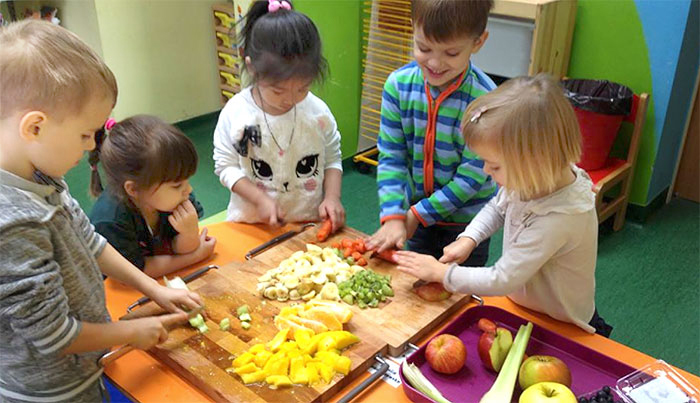
The uniqueness of the school
Our Kids: Are there any other Polish trilingual schools?
Anna Maliszewska: Schools that are called bilingual usually implement two core curricula, for example, Polish and British. There’s no other school that follows a model like ours.
Our Kids: Was this your idea?
Anna Maliszewska: This idea grew. It started from the nursery and went through kindergarten until we got to elementary school. It’s developing all the time and you have to work on it. I am so passionate about it that I’m happy to spend four hours looking at the history program, even though I’m not a historian. How wonderful it is that children, studying the same century, will learn in English about British castles in Scotland, in Spanish about Spanish Catholic kings, and in Polish about the Middle Ages in Poland. It's great to see how it expands their view of the world!
Graduates
Our Kids: Where do your elementary school graduates go?
Anna Maliszewska: A large group goes to the French high school or Francais College, where they’re doing fantastically. Some children go to Polish schools, where they perform well from the point of view of knowledge, intellectual level, and openness, but they’re accustomed to a completely different approach, where they can ask questions and are in close relationships with teachers. And this can lead to problems.
Children also go to IB schools where they have no problems. They’re confident, because they’re open and have never been penalized for that. Even in the French system, which is very strict, our children have very good results, because it’s a system focused on inquiry, i.e., asking questions. However, in Polish schools this is often discouraged. In my opinion, this is by no means the fault of teachers, but rather of the system in which the teachers themselves were educated.
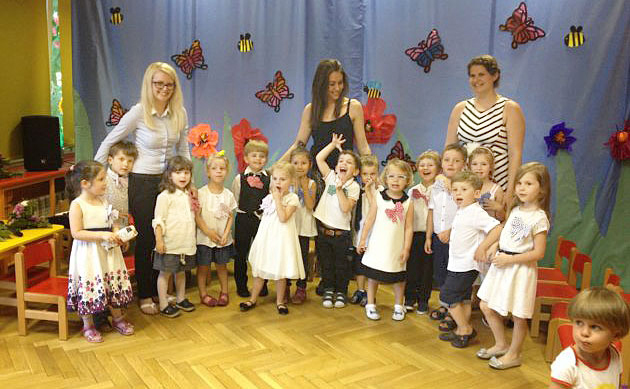
Language level in three languages
Our Kids: What language level do the students achieve? Are they really trilingual?
Anna Maliszewska: When parents come to us with a one-year-old child, we always explain that it’s like a newborn who needs one to one and a half years to learn a language. The same time will be needed for each language in our schools. So a monolingual child will reach the level of trilingualism more or less when ending the preschool, at the age of 4.5 to 5 years old.
At the end of the preschool, children have a 100% passive knowledge of three languages. When it comes to active knowledge—the ability to use a language—it depends on many factors. However, there’s a huge jump between the preschool and the first grade of elementary school, because suddenly they’re required to function in these languages—they must read, study, and speak them. And then the third language—Spanish, Chinese, or French—slows the children down a little, but in children such slowing down, accelerating, coming back, and going forward are natural, and then everything progresses very quickly. Our Grade 6 children pass Dele—a difficult exam in Spanish. They’re really trilingual, and some speak fluently in more than three languages, e.g., Romanian children or children from Iran, who communicate in 3, 4, or 5 languages, and in most of the languages they can also write.
Students
Our Kids: And who are your students?
Anna Maliszewska: About 50% are Polish-speaking children who came to us at the nursery stage, i.e., they’re with us from nursery through preschool and elementary school, and the remaining 50% I would divide into two groups: 25% are children from mixed marriages, where one parent speaks a language we teach, for example, English or Spanish. The remaining 25% of children come from homes where they speak languages that we don’t teach. These are the most unusual languages: Bahasa, Hindi, Farsi, and many more.
Then it’s a matter of adapting the program to these children, and we do it differently than other international schools. For example, when we accept an Iranian child who doesn’t speak any of our school languages, for a year we teach them English intensively (10 to 15 hours a week), in small groups of 2 to 5 students. After this year of intense learning, and sometimes after just six months, when we see the child has already mastered the language to such an extent he or she will be able to function in the classroom, the child is incorporated in the class and everything goes very quickly.
Our Kids: And they manage to catch up?
Anna Maliszewska: Yes, with no problems. The teaching curricula are different—for example, children from Iran have such a high level of math at school that no one in Poland is able to compete, even children taught according to the Polish curriculum, which is very demanding. So if an Iranian child comes to us, we put them through an intensive English course, during which they don’t study math or science. Once they’ve mastered English sufficiently to join the regular class, they’ll catch up in math in three months.
In the nursery and preschool, we immediately place the child in the group, because it’s a different learning stage, with no writing or reading.

I’m very impressed with Canada and how school integration of immigrant children takes place there. We’re a member of the European Council of International Schools organization, which once a year or every two years organizes a conference for schools on language-related topics. Last year, the conference was in Berlin and a world-renowned bilingualism expert Ellen Bialystok came from Canada. It was a very practical presentation showing how it’s done with such success in Canada.
There’s so much research and evidence on how bilingualism can be achieved in children, but many countries don’t take it into account at all. Such a system must be "welcoming," while the Polish system is not integrating, but disintegrating, in particular, when it comes to individualised teaching and, for example, transferring children from foreign to Polish curricula. And it can be done differently.
In our school, we were doing the Chinese New Year, and there were three children from three different countries, where each child presented in a language other than their native tongue. And that shows that children have such an amazing ability to master many languages.
My favourite example is a Romanian girl, who came to us at the nursery stage. She learned Polish as a native speaker, and for three years in elementary school she was the best in Polish in Poland. Then the family moved to Canada. So she speaks Romanian at home, learned Polish, Spanish, and English in our school, and now in Canada she attends a bilingual English-French school.
It's similar in my family, because that's how I designed it for my kids: my youngest son is quintilingual (five languages), and older children are quadrilingual (four languages).
Teachers
Our Kids: Who are the teachers at your school?
Anna Maliszewska: They’re native speakers, who I recruit for three years, but sometimes they stay for a lot longer. But language alone isn’t enough.To teach in our preschool, they must have preschool education qualifications, and to teach in our elementary school, they must have the qualifications in the subjects they teach. Many of them don’t know Polish. Sometimes it happens that someone has Polish roots, but it’s rather uncommon. Our Chinese teachers are from China and Taiwan, our Spanish teachers from Spain and South America, and English teachers from Britain, the US, Canada, and Australia, but also from the Philippines and India. We have teachers from over 20 countries.
Our Kids: So children can get to know different varieties of English and different accents.
Anna Maliszewska: Yes, and I do it on purpose. For example, in a group, I have an American teacher for some time, and then I introduce a Brit. At the beginning, it’s a shock for the kids, but soon it turns out they speak a little differently but have a completely different approach to many issues, and the children adapt to it fantastically.
Achievements and successes
Our Kids: What do you see as your greatest achievement—what are you most proud of?
Anna Maliszewska: The greatest success is the skills of children when they move to other systems, because then this is most visible. They're doing great, and it's great satisfaction for us.
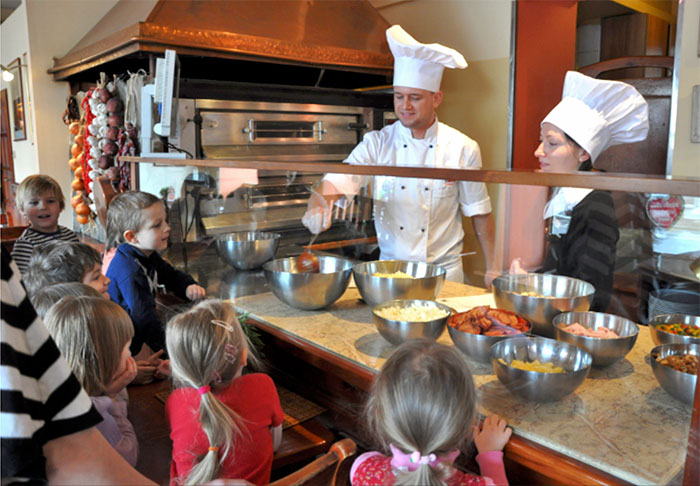
Difficulties/challenges
Our Kids: And the biggest difficulties?
Anna Maliszewska: It depends on the year and the stage of our development. In the last year (and it will remain so for the years to come), the biggest problem was the reform of education in Poland. Not from the administrative point of view. There simply aren’t people who want to work with children. It’s very difficult to find a teacher who has a calling. When I advertise a position of school secretary, I have 10 applications from teachers, but if I need a teacher, I have one CV. People study at the pedagogical departments because they didn’t get accepted anywhere else, and then only 20% of them will finish their studies.
The teacher population is aging and these teachers are burned out, so it's hard to talk about any innovations. The problem is finding good Polish teachers—I have no problem finding foreign language teachers who want to work with children. A good teacher, qualified to teach at early levels in Poland, is incredibly hard to find—a good one meaning one who wants to teach children, not just look after them.
People who read this also viewed:
- Warsaw private schools
- Kraków private schools
- Poznań private schools
- Wrocław private schools
- Łódź private schools
- Rzeszów private schools
- Gdańsk & Gdynia private schools
-
Advice Guide
- ABC of educational terminology: Glossary of terms and concepts
- The admissions process
- Advantages and disadvantages of studying in an international school
- The application process
- Benefits of Polish private schools
- Bilingual schools
- Boarding schools
- Choosing a private or nonpublic school in Poland
- Compare schools in Poland
- English schools in Warsaw
- Homeschooling
- International schools in Kraków
- International schools
- Private school interviews
- Music education
- Myths about private education
- Non-public schools in Poland
- School open houses
- Our Kids Interview: Get to know EF Academy Oxford
- Our Kids Interview: Get to know Open School
- Our Kids interview: Get to know Regent College International Schools
- Our Kids Interview: Get to know The American School of Warsaw
- Our Kids Interview: Get to know The British School Warsaw
- Our Kids Interview: Get to know Wrocław Cosmopolitan School (two interviews, new video)
- Poland school profiles
- Private day schools
- Gifted schools & programs
- Private Jewish schools in Poland
- Language schools
- Private school tuition and costs in Poland
- Private schools in Poland
- Private schools in Poland offering French-language immersion
- English immersion schools
- Poland school uniforms
- Private special needs schools in Warsaw
- Public versus non-public schools in Poland
- Private school questions
- Private school rankings
- Reasons for choosing private schools - Our Kids’s survey report
- Religious schools
- Schools and classes for children with ADHD in Poland
- Social primary schools
- Social Schools
- Special educational needs (SPE) certificates
- Special needs schools
- Study abroad at a private school
- The first annual non-public school fair in Poland
- The first annual Our Kids non-public school expo in Warsaw was a great success
- Third Private School Expo in Warsaw - summary
- Types of schools
- Types of schools in Warsaw
- Warsaw preschool costs
- Why private school?
- Why parents go private
-
Grades
- Boarding high schools
- Choosing a high school in Poland
- Mokotow High School Campus - a new Warsaw high school and Thames British School campus
- Montessori nursery schools
- Montessori preschools
- Our Kids Interview: Get to know English Montessori School Katowice
- Our Kids Interview: Get to know FSA School
- Our Kids Interview: Get to know KIDS & Co.
- Our Kids Interview: Get to know Polish British Academy of Warsaw
- Our Kids Interview: Get to know The English Playhouse and The English Primary
- Poland education: grade levels
- Preschools in Warsaw
- Private & non-public preschools
- Private & non-public primary schools
- Private bilingual elementary schools in Warsaw
- Private high schools
- Private high schools in Warsaw
- Private middle schools
- Nursery schools
- Private primary schools in Warsaw
- Social high schools
-
Locations
- Boarding schools in Warsaw
- English schools in Kraków
- International Baccalaureate (IB) schools in Warsaw
- International schools in Warsaw
- Montessori schools in Warsaw
- Non-public schools in Warsaw
- Our Kids Interview: Get to know EF Academy
- Our Kids interview: Get to know Excellence in Education better
- Our Kids Interview: Get to know PRIMUS Non-Public Primary School No. 47 and Non-Public Secondary School
- Our Kids Interview: Get to know the Canadian School of Warsaw
- Our Kids Interview: Get to know The Primary and Secondary Schools of the Sisters of Nazareth in Warsaw
- Private Catholic and Christian schools in Warsaw
- Private day schools in Warsaw
- Private language schools in Warsaw
- Private schools in Bialystok
- Bydgoszcz schools
- Częstochowa schools
- Private schools in Gdańsk & Gdynia
- Katowice schools
- Private schools in Krakow
- Lublin schools
- Olsztyn schools
- Private schools in Poznań
- Private schools in Rzeszów
- Szczecin schools
- Private schools Warsaw
- Private schools in Wrocław
- Zielona Góra schools
- Private schools in Łódź






 POL
POL CAN
CAN